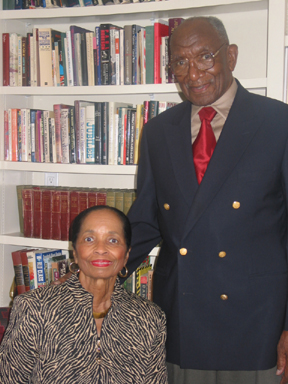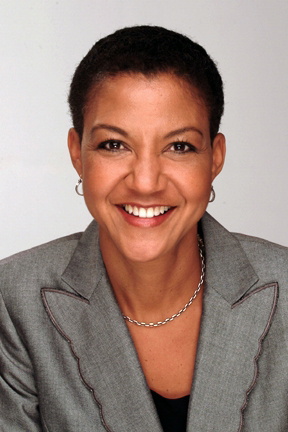By Andrea Juarez
 John and Edna Mosley are benevolent by nature. Over the years the Aurora couple has given generously of their time and talent, serving on a plethora of boards and committees. When friends of the couple raised money to send them on an international vacation in appreciation for their life-long contributions to the community, the Mosleys kindly declined. John and Edna Mosley are benevolent by nature. Over the years the Aurora couple has given generously of their time and talent, serving on a plethora of boards and committees. When friends of the couple raised money to send them on an international vacation in appreciation for their life-long contributions to the community, the Mosleys kindly declined.
“We greatly appreciated their gift,” says Edna. “We opted to use the money for a better cause – a scholarship fund for high school students.”
Adds husband John, “With an education, people have a greater advantage and are better able to compete in this complex world. Education helps people succeed in life.”
When it comes to education, the Mosleys have literally put their money where their mouths are. They are philanthropists.
The John W. and Edna Wilson Mosley Scholarship Fund, administered through the Denver Foundation, is the oldest and largest community foundation in Colorado . In 2006, the fund awarded two Manual High School graduates each a $2,000 college scholarship and a laptop.
The Mosleys graduated from Manual High School and both hold college degrees. And as parents of four children who attended college, they are aware of the costs and appreciate the scholarships their children received.
“We are not wealthy, we have modest means, but even then it’s important to give back to the community, to nurture the young people who have potential,” says Edna. "If we don’t do it, who else will? We need to continue the work of our ancestors. Ordinary people like ourselves can make a difference.”
Who is a philanthropist? Anyone who gives of his time, talent or treasury, says LaDawn Sullivan, chair of the organization Colorado Blacks in Philanthropy and assistant program officer of the Strengthening Neighborhoods Program at the Denver Foundation.
“It is a misperception that philanthropy only involves the giving of money,” Sullivan says. “African Americans have of legacy of giving and taking care of each other. We have supported one another to further the success of the next generation.”
Barclay Jones, vice president of assets for family services at Mile High United Way and a founding member of COBIP, agrees the definition is outdated.
“Historically, a philanthropist was defined as those who gave their money. Now, the definition is more expansive and practical because it also recognizes those who desire to help humanity through time and talent,” says Jones. “Not all of us are millionaires, but each of us can do little things.”
Sullivan works with people and their time and talent. She oversees the Pipeline project, a component of the Denver Foundation’s Expanding Nonprofit Inclusiveness Initiative, which helps nonprofit organizations become more inclusive of people of color.
“The Pipeline assists people of color on an individual level,” Sullivan says. “It helps them connect with nonprofits that seek their skills as a volunteer, staff, board member or donor. It’s a great way to get people of color active in a variety of nonprofits.”
Similarly, Priscilla Brown, executive director of the nonprofit Black United Fund of Colorado also connects people to volunteer opportunities.
“We are a resource for people who want to volunteer for activities in the African-American community, such as the Denver Black Arts Festival,” she says. “Just about every month there is a community activity where we need volunteers.”
When you think about African Americans who give money to charity, it usually conjures up images of the rich and famous like Oprah Winfrey or Bill Cosby. According to the Center on Wealth and Philanthropy at Boston College, African Americans gave approximately $11 billion to charity in 2001 and the numbers are increasing. John Havens, associate director of the Center says African Americans give at the same or larger amounts than their White counterparts at the same income level.
 Lauren Casteel, vice president of Philanthropic Partnerships at the Denver Foundation, said the idea that only rich Blacks give is another misperception. Lauren Casteel, vice president of Philanthropic Partnerships at the Denver Foundation, said the idea that only rich Blacks give is another misperception.
“African Americans have historically given at higher levels of their collective resources,” says Casteel. “That’s regardless of class, percentage of available money and percentage of overall population.”
The National Black United Fund Web site states 52 percent of Black households make charitable contributions and approximately 60 percent goes to churches. The 2005 Giving and Volunteering Study, produced by the Denver Foundation, reports that African Americans and Latinos in metropolitan Denver are more likely to give because of family traditions of giving and because a charity has helped someone they knew.
Casteel says every dollar helps, and donations, whether small or large, have impact. She points, for example, to the local fund for the Martin Luther King, Jr. National Memorial in Washington, D.C., in which the Denver Foundation is the fiscal agent.
“The beauty of contributing to the MLK statue is that there is a collective power of valuing what everyone has to contribute even if it is a few dollars,” she says.
Barclay Jones advises people to research a nonprofit’s status and financial health before they give. This can be done for free online through www.guidestar.org or through the Colorado Secretary of State’s Web site at www.sos.state.co.us. According to the Charitable Solicitations Act of 2002, all nonprofits in Colorado must register every year.
“Check their administrative budget,” says Jones. “Typically, 15 percent of a nonprofit’s budget is allocated to administration compared to the overall agency budget. If 100 percent goes toward programs, it may not be realistic.”
Jones also recommends checking the salaries of the top five employees of the organization, but cautions that people should not expect nonprofit employees to work for poverty wages. He encourages people to consult with a financial advisor and attorney when dealing with large amounts of money, or whenever there’s a desire to form a charitable fund, and learn about the tax and legal implications.
There are several ways to give. One method, workplace giving programs, enable private and public employees to make charitable contributions though payroll withholdings to established nonprofits.
“Payments can be as little as $5 a paycheck and done on a weekly or monthly basis, depending on how the employee’s payroll is set up,” says Brown.
Through BUFCO you can designate money to any of 23 nonprofits that serve the Black community. Employees at Kaiser Permanente, the City of Denver, City of Littleton, City of Aurora, the State of Colorado, Citywide Bank, United Postal Service and Fed Ex can designate withholdings to BUFCO directly or through the United Way or Partnerships for Colorado. An employer may also have a program that matches employee donations.
You can also give directly. When you give to your favorite charity, the nonprofit saves on administration fees. When you give through a foundation or a nonprofit that acts as a collections agent, such as the United Way, the Red Cross or BUFCO, your donation may be subject to administrative fees.
You can form a giving circle. African Americans from across the country are embracing this model. They typically require a minimum annual contribution and a focused charitable cause. Friends, family and neighbors can collaborate and create giving circles through foundations or other entities.
“Giving circles present an opportunity for people to pool their charitable dollars with others who have similar passions,” says Sullivan. “It’s like a coop where each member has input into where the money will go.”
Some also choose to give in lieu of a gift. In any situation where a gift of money is appropriate such as weddings, birthdays, anniversaries or deaths, ask friends and family to instead donate to a charity. You can also make a bequest in your will, where you can specify a particular charity or leave a sum of money to executors with instructions as to how it is to be distributed. Or you can form a donor advised fund, trust or foundation. These mechanisms are more sophisticated and have unique tax and legal implications.
Donor Resources
The Denver Foundation’s ENII Pipeline project for people of color will host a three-part workshop entitled “Connecting to Opportunities in the Nonprofit Sector” starting June 7. Call 303-623-1540 to register.
Black United Fund of Colorado – www.blackunitedfundcolorado.org
Info on the status of nonprofits – www.sos.state.co.us or www.guidestar.org
To make a contribution to the MLK, Jr. National Memorial of $2 or more, mail a check to: The Denver Foundation/MLK Fund, 950 S. Cherry, Suite 222, Denver, CO 80246. Contributions of $50 or more can be charged to a credit card online at www.denverfoundation.org.
The National Center for Black Philanthropy, Inc. – www.ncfbp.net. |
